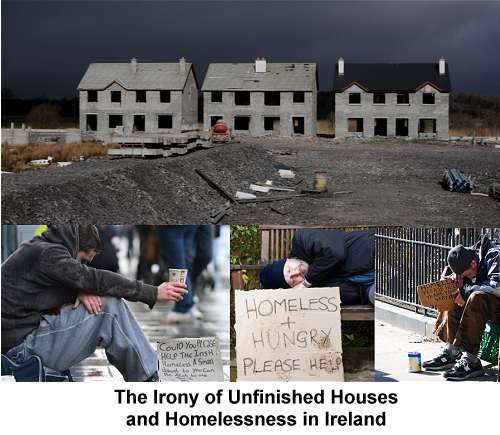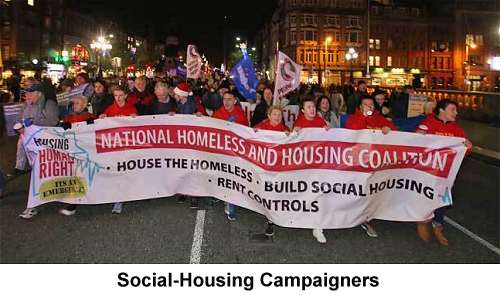Reports from property portals Daft and MyHome suggest that the Irish property market is set to increase by an average of 5% in 2016.

There was a big disparity in the locations of the price rises with the Daft report indicating annual price hikes of as much as 13.3% in Galway compared to 3.6% in Wicklow.
Prices nationally are up 35% since the depths of the property crash in 2013. In Dublin the price inflation is even greater with a 46.5% increase since the bottom of that market in 2012.
The author of the Daft report is Ronan Lyons who is an Assistant Professor of Economics at Trinity College Dublin. He points out that the Central Bank rules that were introduced to try to limit the demand in the housing market are working. The regulations are designed to prevent those people who cannot afford large mortgages from actually getting them (without first providing a substantial cash down-payment).
The reports are sure to put extra focus on the issue of homelessness with thousands of people unable to afford to either buy or even rent a property, especially in Dublin. Many of these families end up in temporary hostels or even Hotel accommodation.
Dr. Lyons suggest that the ultimate solution to the social housing problem may be to reduce the cost of building a home (typically through tax incentives) although he foresees a possible boost for first-time buyers being a politically expedient offering in the next annual Government ‘Budget’.
Ireland operates a ‘social housing’ policy whereby the State is committed to providing accommodation for anyone who needs it. The goal is to provide affordable housing for families with lower incomes to enable them to buy a home. In cases where there are no homes available then privately owned hostels, B&B’s and even Hotels are used by the State agencies to house homeless people.
The real problem lies with the overall lack of supply of suitable houses and apartments. In the wake of the financial meltdown of 2008-2010 the Irish economy contracted dramatically. Building projects were shelved as property developers and the banks went bust. ‘Ghost Estates’ of half-finished housing projects dotted the Irish landscape, reminding the Irish people of their folly.
The rules introduced by the Central Bank of Ireland were designed to prevent a huge property bubble ever happening again and to that extent they are working. But the problem is that, when affordability is put beyond the reach of first-time-buyers then they have no choice but to rent.
Rents have soared hugely in Ireland and especially in Dublin which has the knock-on effect of forcing some people either onto the streets or into a Hotel or B&B accommodation. For those with mental health and/or drug and alcohol addiction problems the issues are even more acute and these people are very much more likely to end up ‘sleeping rough’.

Niamh Randall is the national spokesperson for the Simon Communities:
Rough sleeping is just the tip of the iceberg, there’s lots more difficulty going on and it’s all this hidden homelessness, like people couch-surfing or staying on a floor, and we see that a lot more in rural areas.
They will look for anywhere that means they are in out of the cold and the rain and so they feel safe whether it’s rough sleeping, staying in a shed or staying in squats.’
Pat Doyle is CEO of the Peter McVerry Trust:
(regarding homelessness in rural districts) ‘Those less fortunate are sleeping in wheelie bins, hay sheds and cars across the countryside.’
Of course the problem is solved only by the provision of more housing units and this is where property developers play their part. Lamented as criminals during the economic downturn it is likely that once again the cranes and vans will become fixtures in Irish towns and cities, but perhaps not to the same extent that caused the economy to collapse.
Lets hope so.

 Michael Green is Manager of The Information about Ireland Site
Michael Green is Manager of The Information about Ireland Site
If I didn’t know any better, I would think I was reading about some of the towns in the US experiencing the same issues with lack of housing due to the horrendous cost of rentals and real estate for the average person. The only one’s who can afford current real-estate are the haves with deep pockets. In the mean time, homelessness is increasing like never before for the have-nots who cannot afford to buy a home, let alone rent one.
I agree. I could not live in the states, no, I could not afford to live there. My health insurance cost, car insurance and another myth, who said food was cheap? I left and now I can afford a lot more with my fixed income. It may be the promised land but you need a deep pocket.
Whatever the cause of homelessness there is a duty on the government to resolve it, as a priority. The sight of an Irishman or woman sitting on the pavement begging and then sleeping in doorways in towns and cities where a lunch meal can be 25 euros for those that have the money, is appalling. It would be easy to verify the persons identity and confirm they are genuine, with short shrift to fakers and foreigners. These are our kith and kin. There should be a program in place to accommodate them, nothing luxurious and to provide training for work so that they can regain their dignity. The funding? There are lots of government bungs to organisations that do not deserve any – charity begins at home.